NAIROBI, Kenya— To address the rising levels of noncommunicable diseases, RTI International has launched the 2016 Symposium on Noncommunical Diseases in Nairobi, Kenya, with Kenya’s Ministry of Health and NCD Alliance Kenya.
The event brings together local, regional and international health researchers and stakeholders to provide an opportunity to share ongoing research, identify research needs and formulate a coordinated road map to guide future implementation research on noncommunicable diseases (NCDs) in Kenya. Noncommunicable diseases include cardiovascular disease, diabetes, chronic respiratory diseases and cancer, among others.
“RTI is pleased to collaborate with the Ministry of Health and key stakeholders to develop a research agenda to support the implementation of Kenya’s NCD strategy,” said Sujha Subramanian, Ph.D., an expert at RTI in conducting economic evaluations who is leading RTI’s collaborative research with the Kenyan Ministry of Health.
According to the World Health Organization, NCDs disproportionally affect low- to middle-income countries as the result of higher rates of premature death, lack of detection and treatment, and their contribution to poverty for people who lack health care. Nearly three quarters of NCD deaths occur in these regions of the world.
While speaking at the event, the chief guest Principal Secretary in the Ministry of Health, Dr. Nicholas Muraguri said that Kenya is dealing with a double burden of disease given the increasing cases of both noncommunicable and infectious diseases. He stressed that cardiovascular illnesses and cancers are the leading causes of death after infectious diseases and are mostly due to current lifestyle patterns. The diseases strain Kenyans financially and cause up to six percent slow growth of the economy, said Muraguri.
WHO estimates that NCDs kill 38 million people each year, 28 million of those are in low and middle income countries. Sixteen million of NCD-related deaths occur before the age of 70 with 82 percent of these "premature" deaths occurring in low- and middle-income countries.
Cardiovascular diseases account for most NCD deaths, or 17.5 million people annually, followed by cancers (8.2 million), respiratory diseases (4 million), and diabetes (1.5 million).
The MoH Principal Secretary said that Kenya has increased efforts to address the rising numbers of NCDs by rolling out various interventions aimed at reducing their prevalence in order to lift the burden on the country’s socio-economic development.
Currently, Kenya has set national targets for 2025 and 2030 taking into account the nine global NCD targets and the global Sustainable Development Goal targets for 2030. The government is looking at setting up cancer centers across the country to make it easier for Kenyans to seek early treatment of cancer.
“Addressing NCDs is critically important and these efforts will ultimately help reduce premature mortality from these diseases,” said Rachel Nugent, Ph.D., vice president of Chronic Noncommunicable Diseases Global Initiative at RTI. “RTI is excited to partner with the Ministry of Health to assist with Kenya’s NCD strategy and identify optimal interventions and approaches.”
Speakers at the symposium agreed that the forum was timely because Kenya has developed an NCD strategy and is in the process of developing an appropriate programme to address NCDs prevention and management.
Dr. Joseph Kibachio, head of NCD Control Unit in the Ministry of Health affirmed that the Ministry was making strides in improving the health status of Kenyans, especially through initiatives such as development of a National NCD strategy.
“The risk factors associated with NCDs transcend the health sector; the Ministry of Health cannot tackle it alone. Tackling NCDs requires multi-disciplinary input from the government, education, health, industrial, civil society, and private sectors,” he added.
The government has prioritized NCDs prevention and control in its National Medium Term Plan (MTPII) 2014-2018; National Health Strategic Plan (KNSSP) 2014-2018; the United Nations Development Assisted Framework (UNDAF) 2014-2018 for Kenya; and the Kenya Third Generation WHO Country Cooperation Strategy (2014-2019).

- RTI International launched a symposium on noncommunical diseases in Nairobi, Kenya, with Kenya’s Ministry of Health and NCD Alliance Kenya
- The event provides an opportunity to share ongoing research, identify research needs and formulate a coordinated road map to guide future implementation research on noncommunicable diseases
- NCDs disproportionally affect low- to middle-income countries
RTI International Media Relations:
As an independent, scientific research institute with a mission to improve the human condition, RTI International is engaged by clients and partners to conduct evidence-based research and project implementation. We share our work in line with journalistic and scientific standards and maintain a record in RTI’s Newsroom.
RTI International is an independent scientific research institute dedicated to improving the human condition. Our vision is to address the world's most critical problems with technical and science-based solutions in pursuit of a better future. Clients rely on us to answer questions that demand an objective and multidisciplinary approach—one that integrates expertise across social, statistical, data, and laboratory sciences, engineering, and other technical disciplines to solve the world’s most challenging problems.
For more information, visit www.rti.org.
